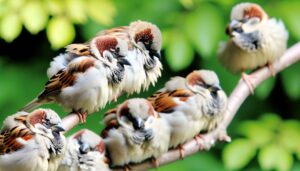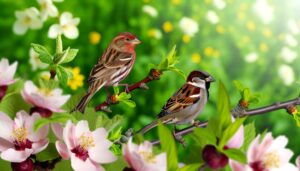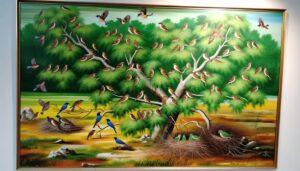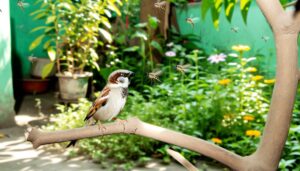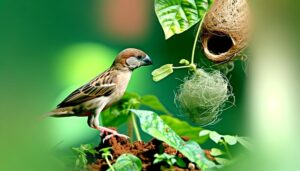How You Can Legally and Ethically Keep a House Sparrow as a Pet
Keeping a house sparrow as a pet requires compliance with the Migratory Bird Treaty Act, which protects these birds and imposes significant fines for violations. Proper habitat management includes maintaining a cage size of at least 18x18x24 inches and guaranteeing environmental stability.
House sparrows need a balanced diet of seeds and insect proteins, alongside enrichment activities for mental stimulation. Social interaction is essential to prevent behavioral issues.
Ethical considerations highlight the impact on natural ecosystems and potential legal repercussions. Understanding these requirements guarantees proper care and compliance with legal standards for house sparrow welfare.
Learn more about best practices and legal obligations.
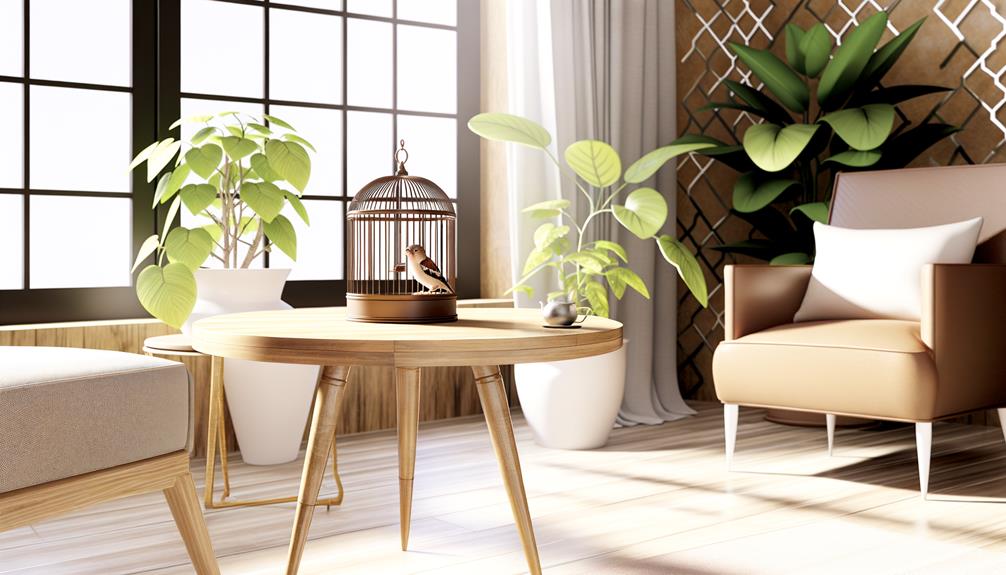
Key Takeaways
- House sparrows are protected under the Migratory Bird Treaty Act, making it illegal to keep them as pets without proper authorization.
- Keeping house sparrows in captivity requires compliance with specific local and national laws and regulations.
- Captive house sparrows need a spacious cage, proper temperature, humidity control, and regular enrichment activities.
- A balanced diet, including seeds, insects, and fresh water, is essential for the health and wellness of house sparrows.
- Social interaction is crucial for house sparrows to prevent stress and behavioral issues, making solitary confinement unethical.
Legal Considerations
When considering keeping a house sparrow as a pet, it is important to be aware of the legal restrictions and regulations that govern the possession of wild birds. In many jurisdictions, house sparrows (Passer domesticus) are protected under the Migratory Bird Treaty Act, which prohibits the capture, possession, and sale of most wild bird species without proper authorization. Violations can result in significant fines and legal repercussions.
Additionally, local laws may further regulate the keeping of non-native species to prevent ecological disturbances. Prospective pet owners should consult relevant wildlife authorities and legal experts to ensure compliance. Understanding these regulations is vital for both ethical stewardship and avoiding legal complications associated with keeping a house sparrow as a pet.
Habitat Requirements
When considering the habitat requirements for a house sparrow, it is important to address space and cage size to guarantee sufficient room for movement and exercise.
Additionally, maintaining ideal temperature and humidity levels is vital for the bird's health and well-being.
Space and Cage Size
Optimal space and proper cage size are essential for the health and well-being of a house sparrow kept as a pet. House sparrows require an environment that allows for natural behaviors such as flying, perching, and foraging. An ideal cage size should be at least 18 inches in length, 18 inches in width, and 24 inches in height.
To create a suitable habitat, consider the following:
- Perches: Provide multiple perches of varying diameters to support foot health and natural perching behavior.
- Cage Accessories: Include items like swings, ladders, and mirrors to encourage mental engagement.
- Flight Space: Ensure the cage is spacious enough for short flights to maintain physical fitness.
Proper habitat management is vital for the sparrow's overall health.
Temperature and Humidity
Maintaining an ideal temperature range between 70°F and 80°F, along with a relative humidity level of 40% to 60%, is essential for the health and well-being of a house sparrow kept as a pet.
Temperature and humidity have a significant impact on the metabolic rate, respiratory function, and overall comfort of the bird. Deviations from these parameters can lead to stress, compromised immune function, and susceptibility to respiratory illnesses.
Monitoring devices are recommended to ensure environmental stability. Additionally, sudden fluctuations should be avoided as they can worsen stress levels.
Housing should be situated in a location free from drafts and direct sunlight to maintain consistent conditions. Proper habitat management will contribute to the longevity and quality of life of the house sparrow.
Enrichment and Stimulation
Providing a stimulating environment with diverse enrichment opportunities is crucial for the cognitive and physical well-being of a house sparrow kept as a pet. Enrichment can mitigate stress, prevent behavioral issues, and enhance the overall quality of life.
Key elements for sparrow habitat enrichment include:
- Foraging Opportunities: Scatter seeds and small insects in varied locations to promote natural foraging behaviors.
- Interactive Toys: Incorporate bells, mirrors, and soft ropes to stimulate mental engagement and prevent boredom.
- Perches and Nesting Materials: Offer an assortment of perches and nesting components like twigs and leaves to support natural nesting instincts and provide physical exercise.
These measures guarantee a balanced and enriching environment, promoting both mental and physical health.
Diet and Nutrition
House sparrows require a balanced diet that includes a variety of seed and grain types to meet their nutritional needs.
Incorporating insect protein sources is vital for providing the necessary amino acids for best growth and health.
Additionally, access to fresh water is important for hydration and overall well-being.
Seed and Grain Preferences
Understanding the dietary preferences of house sparrows is crucial for promoting their optimal health and well-being when kept as pets. House sparrows primarily consume a variety of seeds and grains, which provide essential nutrients necessary for their metabolic functions and overall essentiality.
In curating a best diet, consider the following key seed and grain options:
- Millet: Rich in carbohydrates, millet is a favored choice among house sparrows, offering energy and aiding in proper digestive processes.
- Sunflower Seeds: These seeds are high in fats and proteins, contributing to feather quality and immune system function.
- Canary Seed: Known for its balanced nutritional profile, canary seed supports growth and maintenance of muscle tissue.
Providing a balanced mix of these seeds ensures nutritional adequacy for captive house sparrows.
Insect Protein Sources
In addition to seeds and grains, incorporating insect protein sources into the diet of house sparrows is crucial for meeting their amino acid requirements and promoting overall health.
Insects such as mealworms, crickets, and fly larvae provide essential nutrients like lysine, methionine, and cysteine, which are crucial for tissue repair and growth. These protein sources also offer higher bioavailability compared to plant-based proteins, ensuring efficient nutrient absorption.
Regular inclusion of insects can enhance feather quality, boost immune function, and support reproductive health. It is advisable to provide a variety of insects to mimic their natural diet and prevent dietary deficiencies.
Ensuring a balanced intake of insect protein can significantly contribute to the health and longevity of house sparrows in captivity.
Fresh Water Needs
Adequate access to fresh water is essential for maintaining the physiological and metabolic functions of house sparrows in captivity. Supporting hydration aids important processes such as digestion, thermoregulation, and excretion.
House sparrows require clean, uncontaminated water daily. Here are key guidelines to follow:
- Daily Water Provision: Fresh water should be supplied every day to prevent bacterial growth and contamination.
- Appropriate Water Containers: Use shallow, easy-to-clean dishes to ensure sparrows can drink without risk of drowning or contamination.
- Regular Monitoring and Cleaning: Inspect water sources multiple times daily and clean containers thoroughly to maintain optimal hygiene.
Adhering to these practices is vital for the well-being and longevity of captive house sparrows.
Social Needs
House sparrows exhibit strong social behaviors, demanding regular interaction and mental stimulation to maintain their well-being. In their natural habitat, these birds thrive in flocks, engaging in complex social structures and communal activities. Isolated individuals are prone to stress and behavioral issues, such as feather plucking or vocalization abnormalities.
Hence, if one intends to keep a house sparrow as a pet, it is vital to replicate these social conditions. Providing companionship, either through another sparrow or substantial human interaction, can mitigate the adverse effects of isolation. Enrichment activities, such as interactive toys and foraging opportunities, are essential for their cognitive health.
Understanding and addressing the social needs of house sparrows is key for their overall welfare.
Health and Wellness
Ensuring the health and wellness of a house sparrow requires a thorough understanding of their dietary, environmental, and medical needs. Proper nutrition is crucial; a balanced diet should include seeds, insects, and fresh fruits.
Environmental conditions must be managed, promoting a clean, spacious cage with appropriate perches and nesting materials. Regular veterinary check-ups are essential to monitor for common avian diseases and parasites.
To maintain peak health and wellness, consider the following:
- Dietary Needs: Provide a mix of seeds, insects, and fresh fruits to support a balanced diet.
- Environmental Requirements: Maintain a clean, spacious cage with suitable perching and nesting options.
- Medical Care: Schedule regular veterinary visits to prevent and treat common avian diseases and parasites.
Adhering to these guidelines promotes a healthy, thriving house sparrow.
Training and Enrichment
Training and enrichment are essential components in fostering the cognitive and behavioral development of a house sparrow. Structured activities can greatly enhance a sparrow's mental well-being and social behaviors. Enrichment can be achieved through a variety of methods, including interactive toys, foraging opportunities, and social interaction.
| Activity Type | Description | Benefits |
|---|---|---|
| Interactive Toys | Toys that stimulate problem-solving skills | Cognitive enhancement |
| Foraging Activities | Hiding food to encourage natural behaviors | Behavioral enrichment, physical activity |
| Social Interaction | Interaction with humans or other birds | Social development, reduced stress |
Incorporating these activities into a house sparrow's daily routine can lead to a more enriched and balanced life, promoting overall health and well-being.
Ethical Concerns
Ethical considerations are paramount when deciding to keep a house sparrow as a pet, encompassing both the bird's welfare and broader environmental impacts.
The primary ethical concerns include:
- Animal Welfare: House sparrows are wild birds that may suffer from inadequate care if kept in captivity. Their natural behaviors, such as foraging and social interactions, can be notably restricted.
- Legal and Conservation Issues: In many regions, capturing and keeping wild birds is illegal due to protective legislation aimed at preserving native species and their ecosystems.
- Ecosystem Disruption: Removing house sparrows from their natural habitat can disrupt local ecosystems, affecting food webs and biodiversity.
These factors underscore the importance of considering both individual and ecological well-being when contemplating the domestication of house sparrows.
Conclusion
Legal restrictions, specialized habitat requirements, nutritional needs, social dynamics, health considerations, and ethical concerns collectively argue against keeping house sparrows as pets.
For instance, the Migratory Bird Treaty Act in the United States prohibits the capture and possession of native birds like sparrows without proper permits, highlighting the legal ramifications.
Consequently, the complexities involved in meeting the species-specific needs and adhering to legal regulations underscore the challenges and ethical dilemmas in maintaining house sparrows in captivity.

